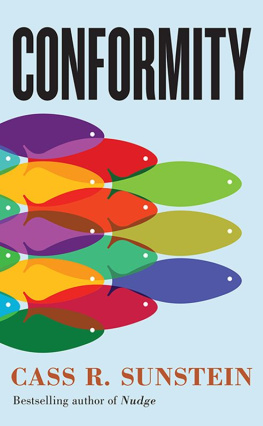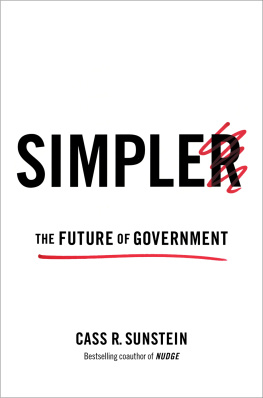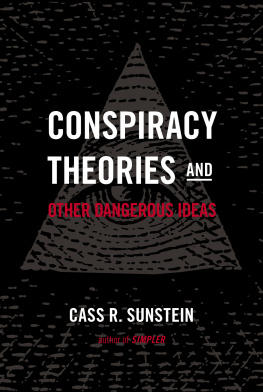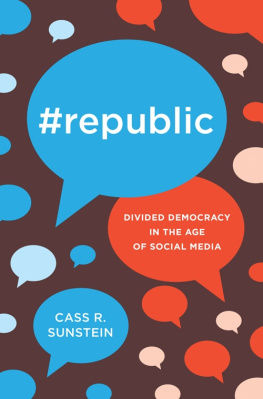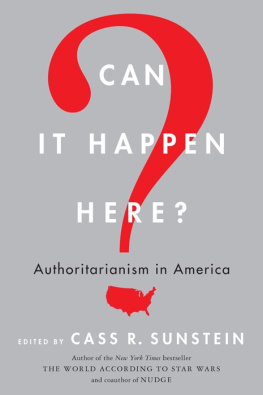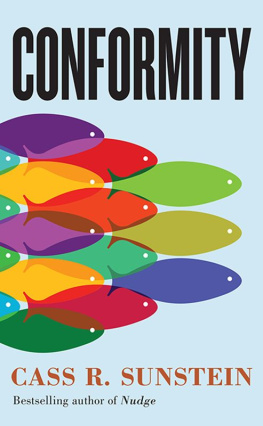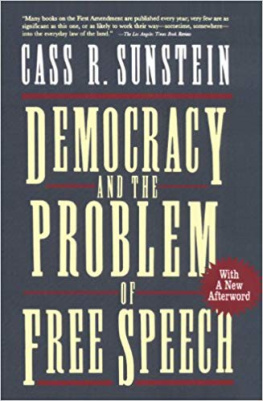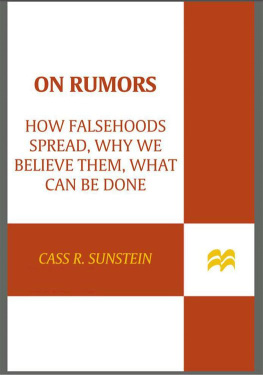Cass R. Sunstein - Conformity
Here you can read online Cass R. Sunstein - Conformity full text of the book (entire story) in english for free. Download pdf and epub, get meaning, cover and reviews about this ebook. publisher: NYU Press, genre: Politics. Description of the work, (preface) as well as reviews are available. Best literature library LitArk.com created for fans of good reading and offers a wide selection of genres:
Romance novel
Science fiction
Adventure
Detective
Science
History
Home and family
Prose
Art
Politics
Computer
Non-fiction
Religion
Business
Children
Humor
Choose a favorite category and find really read worthwhile books. Enjoy immersion in the world of imagination, feel the emotions of the characters or learn something new for yourself, make an fascinating discovery.
- Book:Conformity
- Author:
- Publisher:NYU Press
- Genre:
- Rating:3 / 5
- Favourites:Add to favourites
- Your mark:
- 60
- 1
- 2
- 3
- 4
- 5
Conformity: summary, description and annotation
We offer to read an annotation, description, summary or preface (depends on what the author of the book "Conformity" wrote himself). If you haven't found the necessary information about the book — write in the comments, we will try to find it.
Conformity — read online for free the complete book (whole text) full work
Below is the text of the book, divided by pages. System saving the place of the last page read, allows you to conveniently read the book "Conformity" online for free, without having to search again every time where you left off. Put a bookmark, and you can go to the page where you finished reading at any time.
Font size:
Interval:
Bookmark:
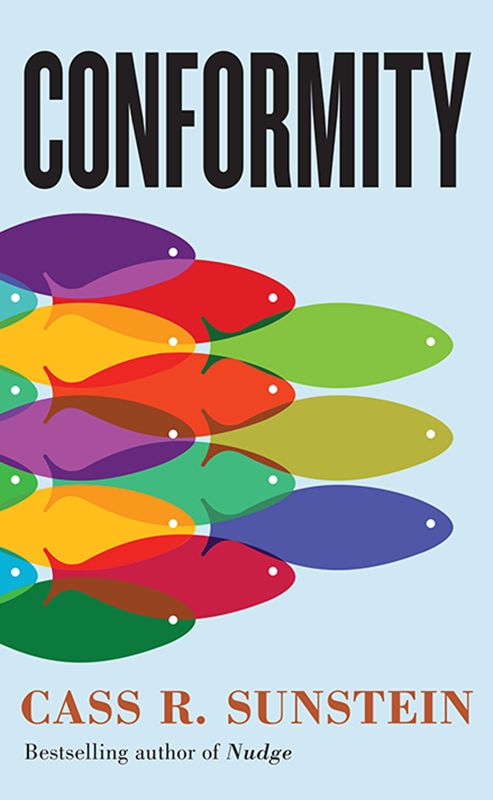
Cass R. Sunstein

NEW YORK UNIVERSITY PRESS
New York
NEW YORK UNIVERSITY PRESS
New York
www.nyupress.org
2019 by New York University
All rights reserved
References to Internet websites (URLs) were accurate at the time of writing. Neither the author nor New York University Press is responsible for URLs that may have expired or changed since the manuscript was prepared.
Library of Congress Cataloging-in-Publication Data
Names: Sunstein, Cass R., author.
Title: Conformity : the power of social influences / Cass R. Sunstein.
Description: New York : New York University Press, 2019. | Also available as an ebook. | Includes bibliographical references and index.
Identifiers: LCCN 2018041768| ISBN 9781479867837 (cl ; alk. paper)
Subjects: LCSH: Sociological jurisprudence. | LawSocial aspects. | Conformity. | Social influence.
Classification: LCC K370 .S83 2019 | DDC 340/.115dc23
LC record available at https://lccn.loc.gov/2018041768
New York University Press books are printed on acid-free paper, and their binding materials are chosen for strength and durability. We strive to use environmentally responsible suppliers and materials to the greatest extent possible in publishing our books.
Manufactured in the United States of America
10 9 8 7 6 5 4 3 2 1
Also available as an ebook
This short book has traveled a long and winding road. In early 2003, I delivered the Oliver Wendell Holmes, Jr., Lectures at Harvard Law School, under the title Conformity and Dissent. With the help of the comments I received during and after the presentation, the lectures were reoriented, expanded, and transformed into a book, Why Societies Need Dissent, published by Harvard University Press in late 2003. There is of course a significant overlap between the original text and that book. But I retained a fondness for the original lecture text, which was not only significantly shorter but also more focused, less polemical, and a bit less preachyand also more quizzical, and in some ways (I like to think) more enduring.
As of this writing, there is mounting worldwide attention to the problem of conformity, and also to associated questions about identity, extremism, cascades, polarization, and diversity. This book is a contemporary version of the original text, with a new preface and a variety of changes, mostly for updating and clarity of exposition. I am acutely aware that with respect to the underlying social science, there have been significant developments since 2003. I have done my best to summarize the leading developments and to avoid relying on controversial claims and findings, though the field continues to progress.
It took a village. For valuable discussions and comments, I am grateful to Jacob Gersen, Reid Hastie, David Hirshleifer, Christine Jolls, Catharine MacKinnon, Martha Nussbaum, Susan Moller Okin, Eric Posner, Richard Posner, Lior Strahilevitz, Edna Ullmann-Margalit, and Richard Zeckhauser. Special thanks to my agent, Sarah Chalfant, for help and support, and to my editor, Clara Platter, for valuable suggestions throughout and above all in connection with the preface. Andrew Heinrich and Cody Westphal provided excellent research assistance.
Conformity is as old as humanity. In the Garden of Eden, Adam followed Eves lead. The spread of the worlds great religions is partly a product of conformity. Books remain to be written on this topic, with special attention to Christianity, Islam, and Judaism.
Conformity also makes atrocities possible. The Holocaust was many things, but it was emphatically a tribute to the immense power of conformity. The rise of Communism also reflected that power. Contemporary terrorism is not a product of poverty, mental illness, or a lack of education. It is a product, in large part, of the pressure that some people put on other people. That pressure has everything to do with conformity. When people of one political party march together, develop dogmas and rages, and ridicule people of another political party, conformity is at work. In its worst forms as well as its best, nationalism is fueled by conformity.
As we shall see, the idea of conformity is far more interesting and less simple than it seems. But two ideas capture much of the territory. First, the actions and statements of other people provide information about what is true and what isright. If your friends and neighbors worship a particular God, fear immigration, love a nations current leader, believe that climate change is a hoax, or think that genetically modified food is dangerous to eat, you have reason to believe all those things. You might well take their beliefs as evidence of what you should believe.
Second, the actions and statements of other people tell you what you ought to do and say if you want to remain in their good graces (or get there in the first place). Even if you disagree with them in your heart of hearts, you might silence yourself or even agree with them in their presence. Once you do that, you might find yourself starting to shift internally. You might begin to act and even to think as they do.
The subject of conformity is not limited to any particular time and place, and I hope that the same is true of the discussion of that subject here. But it is worth noting that modern technologiesand above all the Internetcast long-standing phenomena in a new light. Suppose that you live in a small, remote village, with a high degree of homogeneity. What you know will be mostly limited to what is known in that village. Your beliefs might well mirror those of your neighbors. You might be entirely rational, but what you believe might not be rational at all. As Justice Louis Brandeis noted, Men feared witches and burnt women.
Unless your own imagination and experiences lead you in fresh directions, you will act and think as your neighbors do. To be sure, some people are rebels, and they can add to a societys stock of information. For them, deviance is far more appealing than conformity. They want to be deviants. But if your world is limited, your horizons will be limited as well. There will be limits to what you can see and imagine.
Now suppose that wherever you live, you spend much of your time online. In some ways, the entire world is at your disposal. If you do a search for the worlds religions, you can learn a great deal in an extraordinarily short time. If you do a search for climate change hoax, you can discover diverse views, and if you are willing to spend an hour or two on the topic, you can obtain at least a rough understanding of what scientists think. If you search for genetically modified food health risks, you can find studies of multiple kinds and various reports, some of them highly technical. Sorting out what is reliable may not be easy. There are countless falsehoods out there. But here is the point: if you are inclined to conform, you will have to do a fair bit of work before you decide what, or whom, you will conform to.
In most ways, that is an immense step forward for the human species. Our potential horizons are far broader than they ever were, and they are getting broader all the time. At the same time, human beings appear to be tribal. Wherever we livea small village or New York, Copenhagen, Jerusalem, Paris, Rome, Beijing, or Moscowwe develop allegiances. Once we do that, we follow informational signals from some people rather than others. We want the approval of those we love, admire, like, and trust. For that reason, conformity pressures will remain, even if there are a lot of tribes out there and even if we have some freedom to choose among them. (I once asked a new friend why we liked each other so much. Her answer came back immediately: Same tribe.)
Next pageFont size:
Interval:
Bookmark:
Similar books «Conformity»
Look at similar books to Conformity. We have selected literature similar in name and meaning in the hope of providing readers with more options to find new, interesting, not yet read works.
Discussion, reviews of the book Conformity and just readers' own opinions. Leave your comments, write what you think about the work, its meaning or the main characters. Specify what exactly you liked and what you didn't like, and why you think so.

